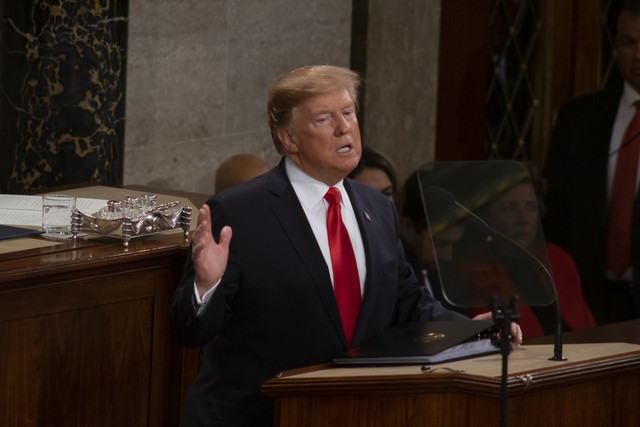Washington, April 16 (NNN-Prensa Latina) The repeated assertion by U.S. President Donald Trump and other U.S. government officials of ”having all options on the table” against Venezuela is gaining ground this Monday for the possible use of military force.
Over the last few days, the rhetoric of the U.S. administration, frankly attacking the South American country and its constitutional president, Nicolas Maduro, climbed positions, along with economic sanctions against vessels and entities of the Venezuelan oil industry.
As political analysts and the media point out, Washington is trying to tighten the siege to achieve the overthrow of Maduro, who received 68 percent support at the polls last year, when he was re-elected head of state.
Five days ago, the Center for Strategic and International Studies, one of the so-called think tanks based in this capital, organized the private roundtable ‘Evaluation of the Use of Military Force in Venezuela,’ revealed investigative journalist Max Blumenthal.
On the Grayzone website, which he founded, he noted that the meeting, whose participants refused to provide details, brought together some 40 guests, two of whom confirmed their attendance at the publication.
Some of those present were some of Trump’s most influential advisors on anti-Venezuela policy, and current and former officials from the State Department, the intelligence community, and the National Security Council.
Also at the event were Admiral Kurt Tidd, until recently head of the Southern Command, representatives of the embassies of Brazil and Colombia, the latter’s general Juan Pablo Amaya, and delegates of Juan Guaido, a self-proclaimed acting Venezuelan president.
In addition to other steps, which show their interferenceist attitude, Trump recognized last January 23 to Guaido, head of the National Assembly, parliament in contempt, for that position.
Since then, and with more force, the aggressions and provocations against Venezuela are constant, victim in addition to an intense economic war centered on bringing discontent among the population.
‘We’re talking about military, uh… military options in Venezuela,’ Sarah Baumunk, an associate researcher with the Americas Program at the aforementioned Sarah Baumunk Center, told Blumenthal.
According to the reporter, the analyst became nervous and said she did not feel comfortable answering other questions, as did Santiago Herdoiza, an associate researcher with the international consulting firm Hills & Company.
One day after the meeting, Republican Senator Rick Scott, who lives near Trump, said Washington should begin to consider the military option to bring supposed humanitarian aid to Venezuela.
In the opinion of the Florida legislator, and as other colleagues maintain, Maduro’s administration constitutes a threat to the security of the United States.
‘So far, sanctions alone have not stopped Maduro, and the United States needs to start considering the use of military assets to bring aid to the millions of sick and hungry Venezuelans,’ Scott said.
‘I urge the government, Congress and the American people to see this crisis for what it is, a rising tide of social and economic collapse promoted and financed by our enemies,’ he added.
Also, in the middle of last week, U.S. Vice President Mike Pence assured that his country will continue to pressure Venezuela to achieve what Washington calls a transition to democracy, although ‘all options remain on the table.
Pence’s statements, which demanded Guaidó’s recognition, came at a United Nations Security Council meeting on Venezuela, the third convened by Washington after those held in January and February.
‘This Security Council has refused to act, it is time for the United Nations to act and for the world to support the Venezuelan people,’ he added, ignoring the actions of Maduro’s government in favor of the people of the South American country.
Pence can´t understand in his arrogance, in his arrogance, in his arrogance, in his racial supremacism that he cannot give orders for Venezuela or for the world, responded Maduro from Caracas.
He also stressed that the U.S. vice-president made a fool of himself in his attempt to force Guaido’s recognition.
Previously, Venezuelan Ambassador to the United Nations, Samuel Moncada, rejected U.S. threats and warned of steps to invade his country.
On what legal basis can one country come here to threaten another at this table, the diplomat asked at the Security Council meeting.
In Moncada’s opinion, the only way to help Venezuela is to return the money stolen from that nation, and to end U.S. economic sanctions and threats of military intervention.





